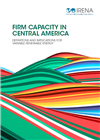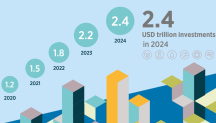

-
-
IRENA (2023), Firm capacity in Central America: Definitions and implications for variable renewable energy, International Renewable Energy Agency, Abu Dhabi.
Copied
https://www.irena.org/-/media/Files/IRENA/Agency/Publication/2023/Aug/IRENA_Firm_capacity_Central_America_2023.pdf
Copied
Firm capacity in Central America: Definitions and implications for variable renewable energy
Newsletter
Worldwide, firm capacity is a commercial attribute that generators can use as a trade asset in an electricity market, or offer as a guarantee to the system in exchange for a regulated payment - the signing of long-term contracts with distribution companies and large consumers is also an option for commercialisation.
Rising concerns among project developers and investors in the Central America region relate to a quickly saturating power market, the limited ability to trade into the regional market, and purchase power agreements (PPAs) for wind and solar PV that vary extensively from country to country.
The regulatory component of IRENA’s Clean Energy Corridor of Central America (CECCA) initiative focuses on assessing solar and wind PPAs to ensure a level playing field for renewables vis-à-vis conventional generation, given that current frameworks appear to offer limited investment incentives for variable renewable energy (VRE). To support this work, IRENA developed this report to provide an overview on the use of firm capacity across countries in the region and for contracting power generated by renewables.




